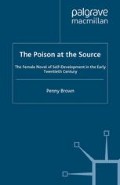Abstract
May Sinclair (1863–1946) is one of many women novelists of her period who, despite being highly regarded in their own day, have been comparatively and unjustly neglected by literary critics. This injustice becomes even more apparent on looking back over the development of the novel in England, for she was a talented and deeply committed writer who was one of the first to experiment with form in the modern novel and was involved with many of the literary and philosophical trends of her day.1
If you looked back on any perfect happiness you saw that it had not come from the people or the things you thought it had come from, but from somewhere inside yourself.
Mary Olivier: A Life
Access this chapter
Tax calculation will be finalised at checkout
Purchases are for personal use only
Preview
Unable to display preview. Download preview PDF.
Notes
Sinclair’s biographer, Theophilus E.M. Boll, compares her to George Eliot in this respect in Miss May Sinclair: Novelist. A Biographical and Critical Introduction ( New Jersey: Fairleigh Dickinson University Press, 1973 ), p. 21.
Introduction to Charlotte Brontë, Villette, Everyman Series (London: J.M. Dent, 1909), pp. xiv-xv.
Virginia Woolf, ‘Modern Fiction’, The Common Reader ( London: Hogarth Press, 1948 ), p. 189.
Rebecca West claimed that May Sinclair was showing Dorothy Richardson how to do what she was trying to achieve in Pilgrimage. Cited in Nicola Beauman, A Very Great Profession: The Women’s Novel 1914–39 ( London: Virago, 1983 ).
See the interesting discussion on the significance of such naturistic epiphanies for the adolescent female protagonist in Annis Pratt (with Barbara White, Andrea Loewenstein and Mary Wyer), Archetypal Patterns in Women’s Fiction ( Brighton: Harvester, 1982 ), pp. 16–24.
Radford, Introduction, The Life and Death of Harriet Frean, p. v; and George Eliot, The Mill on the Floss, ed. E.S. Byatt ( Harmondsworth, Penguin, 1985 ), p. 427.
Author information
Authors and Affiliations
Copyright information
© 1992 Penny Brown
About this chapter
Cite this chapter
Brown, P. (1992). May Sinclair: The Conquered Will. In: The Poison at the Source. Palgrave Macmillan, London. https://doi.org/10.1057/9780230373167_2
Download citation
DOI: https://doi.org/10.1057/9780230373167_2
Publisher Name: Palgrave Macmillan, London
Print ISBN: 978-1-349-38883-7
Online ISBN: 978-0-230-37316-7
eBook Packages: Palgrave Literature & Performing Arts CollectionLiterature, Cultural and Media Studies (R0)

